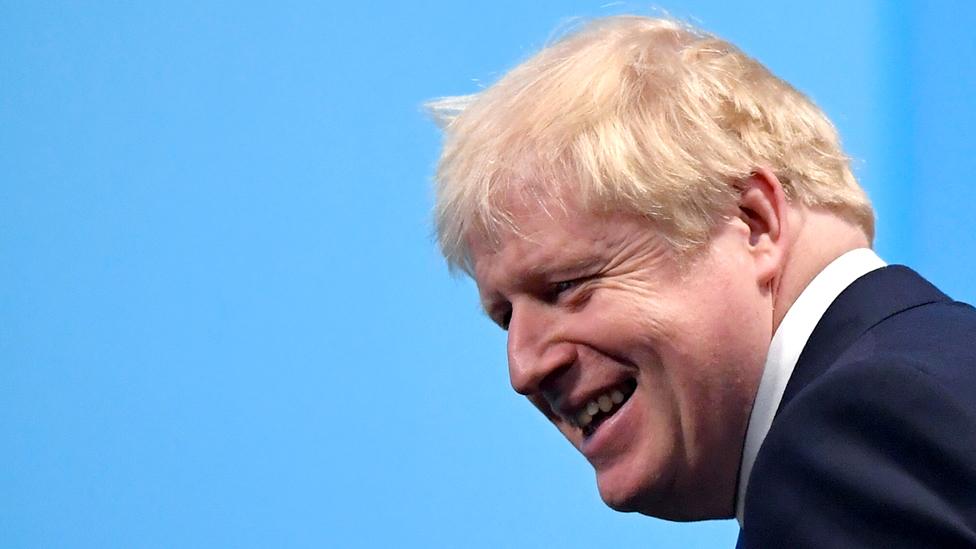Prime Minister Johnson's political honeymoon is already over
- Published
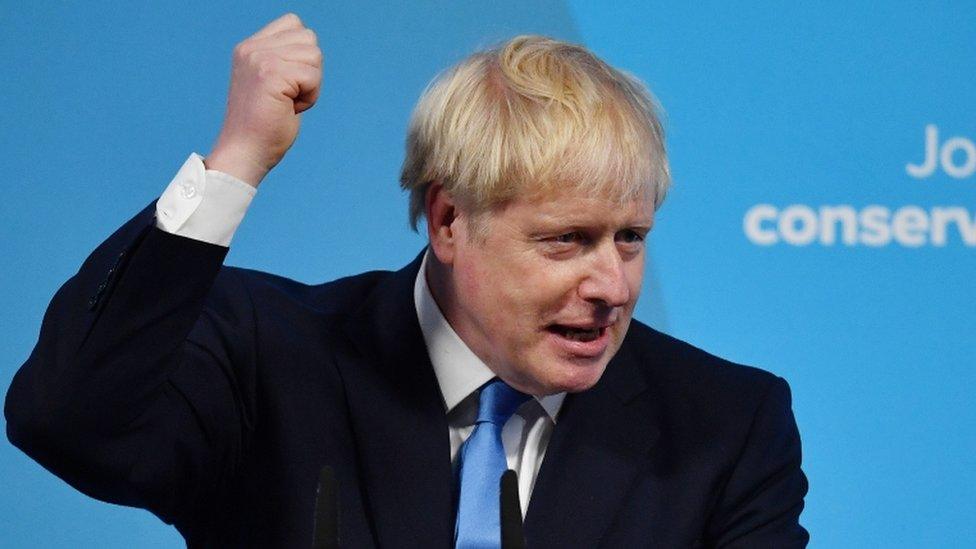
Boris Johnson gave an energetic performance in his victory speech - but energy may not be enough
So how was it for you? The Boris Johnson political honeymoon, that is. For the avoidance of doubt, it is now over. In truth, it never started.
No doubt you followed the Conservative leadership announcement on the BBC, with the wonderfully energetic Norman Smith proclaiming the scene outside the London venue to be "plaza del chaos", replete as it was with competing demonstrators.
Perhaps the programme should have been prefaced with a solemn continuity announcer warning that the upcoming show contained "scenes which some viewers might find disturbing".
Boris Johnson himself appeared to agree, noting wryly - as only he can - that there were many in the party, indeed in the hall, who were wondering what they had done by electing him to high office.
The Tory audience tried their best to introduce a degree of razz and even a smidgeon of concomitant matazz.
But you could tell their hearts weren't in it. They know - they know - that their newly chosen leader is instantly embroiled in a genuine, 24 carat political crisis. And one, moreover, to which he has contributed hugely.
In a deliberately knockabout speech - he'll keep the heavy stuff for the Commons where he needs the votes in divisions on Brexit - Mr Johnson contrived to sound decidedly upbeat.
He was "can-do". He was "ping off the guy ropes of self-doubt". He was delivery and action. He was energetic.
He sounded up for it. He looked faintly scared. Aware of the extent of the challenge and the current limitations of the proposed solutions.
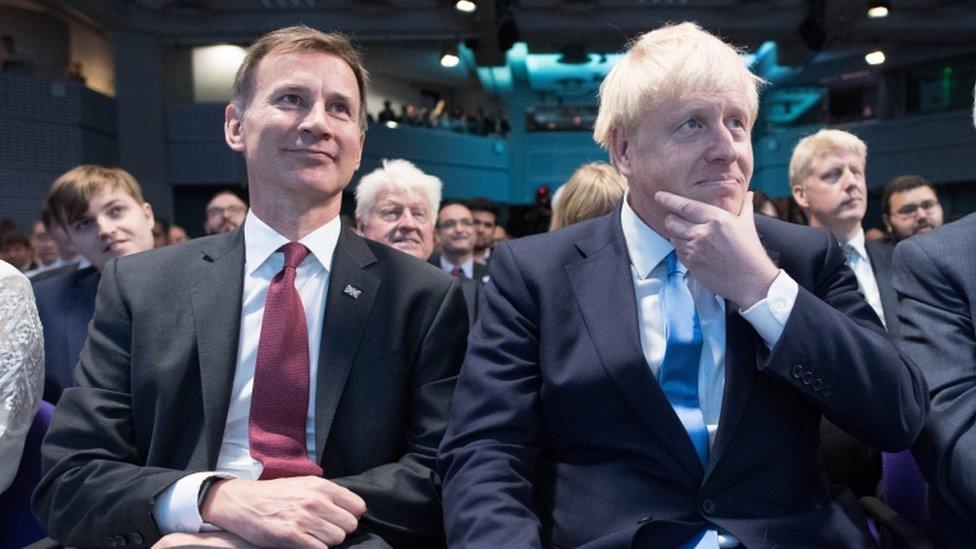
Boris Johnson defeated rival Jeremy Hunt (left) handily - but he knows there are stiffer challenges ahead
In terms of intent, of political pitch, his acceptance speech probably hit the right, temporary note. Void of content. Heavy on rhetoric.
Giving the immediate audience what they wanted to hear. Brexit? A doddle. Corbyn? Ancient history. UK unity? Leave it to B.
After the agonies of Theresa May's uncertain leadership - which followed a catastrophic election campaign in 2017 - the Tories want robust reassurance, not timid acquiescence. They want Churchill, not Chamberlain.
Mr Johnson is many things. But he is not daft. He knows - he knows - that he faces a huge problem to deliver Brexit, especially by the target date of Hallowe'en.
A problem to strike a deal with a reluctant and increasing fractious and bored EU. A problem to steer a no-deal departure - which he insists he doesn't want - past a determined, if divided, Commons.
Energy there will be. But energy may not be enough. One can be energetically wrong. One can pursue a stupid policy, with vigour and resolve. Doesn't make it sensible.
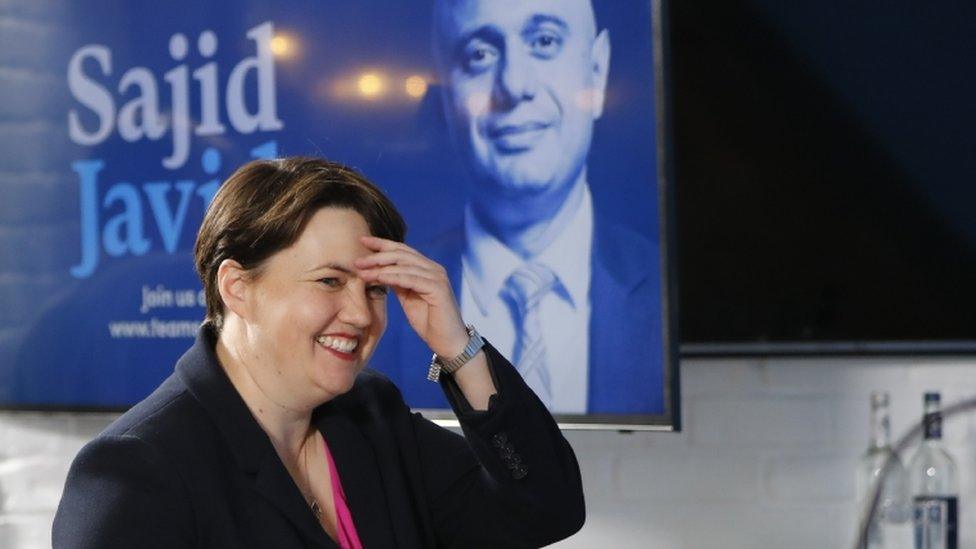
Ruth Davidson backed a succession of Tory leadership candidates, none of them Mr Johnson
And then there is Scotland. Mr Johnson's election presents an immediate problem for Scots Tories, given that he would appear to be less than popular north of the border.
Ruth Davidson can do little more than live with it, while hoping to moderate his rhetoric. For Mr Johnson has a record of sceptical, even caustic, comments about Caledonia.
Ten years ago, I prepared a lavish documentary about a decade of devolution. It featured Mr Johnson, then the all-action Mayor of London, saying that he disliked the cash going north of the border, which he saw as depriving his citizens in the UK capital.
He has said the same umpteen times since. He has said that a pound spent in Croydon does more for the broad UK economy - including Scotland - than a pound spent to the north of Hadrian's Wall.
He has questioned whether a Scot can again be prime minister. He has challenged the Barnett funding formula, although he has since recanted and said it would stay.
All this we know. But now he has to seek to govern the UK, including Scotland. If there is a pragmatic side to Boris Johnson - and I certainly think there is - then it will emerge over this question, perhaps as much as in relation to Brexit where his flexibility may be constrained by previous comments, not least during the election campaign.
Nicola Sturgeon: Boris Johnson has "no sense of principle"
So expect Mr Johnson to underline the importance to him of the union. Not perhaps the hand-wringing emotion of a John Major. But with passion in evidence, authentic or assembled.
Expect him too to stress the contribution of Scotland to the UK's status in global affairs. And the contribution of the UK to projects in Scotland - a concept which the Scots Tories were beginning to test before the leadership contest.
In response, First Minister Nicola Sturgeon told me she would congratulate Mr Johnson on his election - while stressing her determination to work with him where mutual interests could be discerned.
But she warned simultaneously that she would exert every sinew to thwart Brexit - and, in particular, a no-deal Brexit. Further, she said that Mr Johnson would not be able to prevent an independence referendum, should Scots exhibit support for one.
On this, I thought it significant that, as in the past, Ms Sturgeon's immediate focus was Brexit. Not Scottish independence.
That does not, repeat not, repeat not, mean that she has shelved that ambition in any way whatsoever.
It does mean, however, that she still wants to fight the immediate battle of Brexit first. Expect her to issue a formal demand for an independence referendum to the new PM later this year, with a target date of the end of 2020.
Expect the new PM to say no. Expect there to be a substantial row with the most likely outcome - at this stage - that the issue will dominate the 2021 Holyrood elections.
Final thought. Character matters in politics. Mr Johnson made that clear in his own acceptance statement when he underlined the necessity of pursuing projects with vigour and compelling charisma.
Ms Sturgeon's verdict on the new Tory leader, you will be astonished to learn, is rather different.
She sees him as a charlatan who has no political principles beyond self-advancement.
- Published23 July 2019
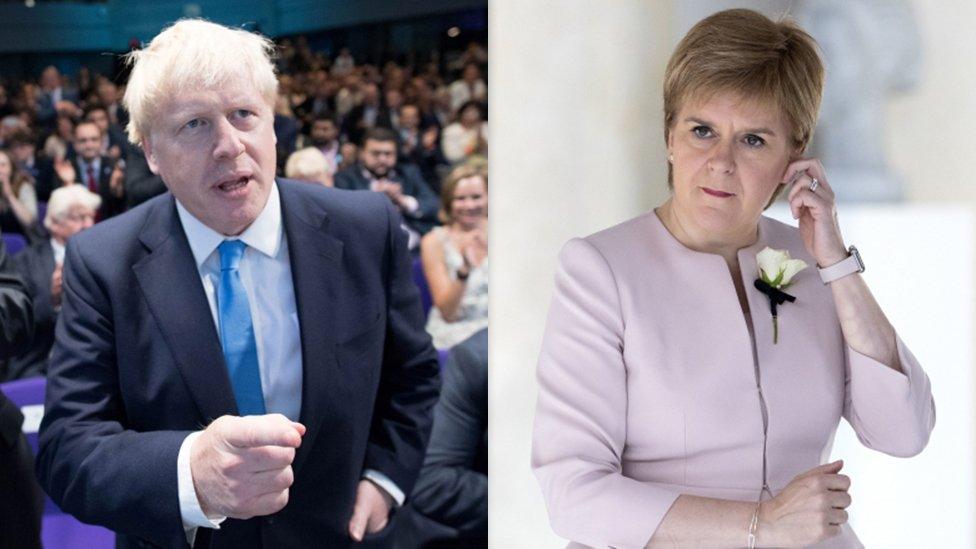
- Published23 July 2019
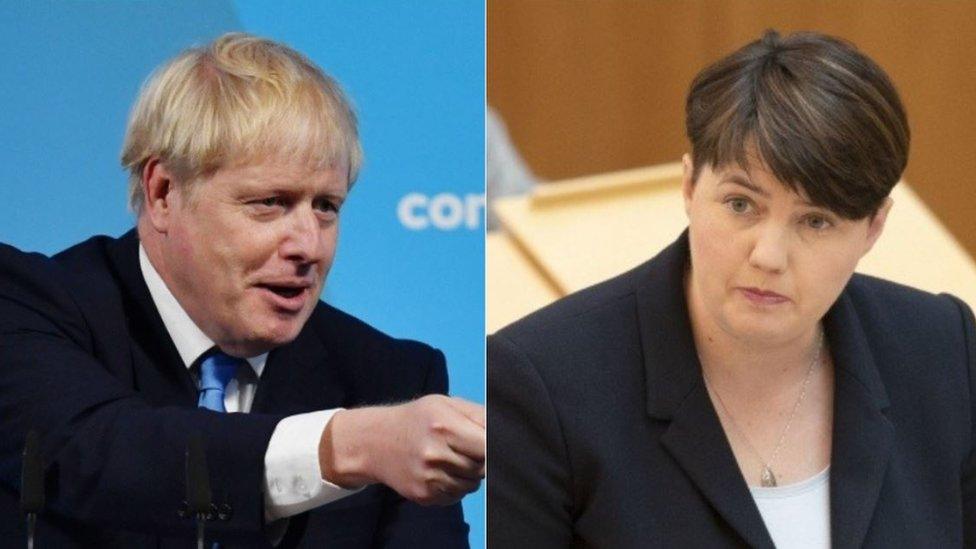
- Published23 July 2019
